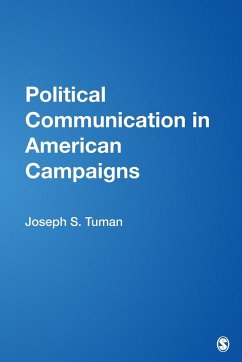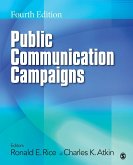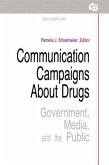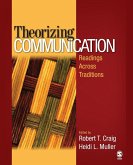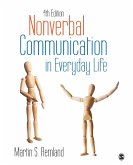Joseph S. Tuman
Political Communication in American Campaigns
Joseph S. Tuman
Political Communication in American Campaigns
- Broschiertes Buch
- Merkliste
- Auf die Merkliste
- Bewerten Bewerten
- Teilen
- Produkt teilen
- Produkterinnerung
- Produkterinnerung
Political Communication provides a comprehensive, clear, and accessible treatment of American campaign rhetoric. Taking a truly communicative approach to political communication, the text explores campaigns in terms of their management and message orientation and focuses on communication strategies as regards speeches, debates, and the use of paid and free media (e.g., print and broadcast ads; the Internet; etc.). Case studies of actual campaign speeches, political debates, and mass media campaigns show the application of theories and methodologies.
Andere Kunden interessierten sich auch für
![Public Communication Campaigns Public Communication Campaigns]() Ronald E. RicePublic Communication Campaigns192,99 €
Ronald E. RicePublic Communication Campaigns192,99 €![Communication Campaigns About Drugs Communication Campaigns About Drugs]() Communication Campaigns About Drugs47,99 €
Communication Campaigns About Drugs47,99 €![Social Media and Election Campaigns Social Media and Election Campaigns]() Social Media and Election Campaigns72,99 €
Social Media and Election Campaigns72,99 €![Cross-Cultural and Intercultural Communication Cross-Cultural and Intercultural Communication]() William B. GudykunstCross-Cultural and Intercultural Communication192,99 €
William B. GudykunstCross-Cultural and Intercultural Communication192,99 €![Engaging Theories in Interpersonal Communication Engaging Theories in Interpersonal Communication]() Dawn O. BraithwaiteEngaging Theories in Interpersonal Communication162,99 €
Dawn O. BraithwaiteEngaging Theories in Interpersonal Communication162,99 €![Theorizing Communication Theorizing Communication]() Robert T. Craig / Heidi L. Muller (eds.)Theorizing Communication192,99 €
Robert T. Craig / Heidi L. Muller (eds.)Theorizing Communication192,99 €![Nonverbal Communication in Everyday Life Nonverbal Communication in Everyday Life]() Martin S. RemlandNonverbal Communication in Everyday Life162,99 €
Martin S. RemlandNonverbal Communication in Everyday Life162,99 €-
-
-
Political Communication provides a comprehensive, clear, and accessible treatment of American campaign rhetoric. Taking a truly communicative approach to political communication, the text explores campaigns in terms of their management and message orientation and focuses on communication strategies as regards speeches, debates, and the use of paid and free media (e.g., print and broadcast ads; the Internet; etc.). Case studies of actual campaign speeches, political debates, and mass media campaigns show the application of theories and methodologies.
Hinweis: Dieser Artikel kann nur an eine deutsche Lieferadresse ausgeliefert werden.
Hinweis: Dieser Artikel kann nur an eine deutsche Lieferadresse ausgeliefert werden.
Produktdetails
- Produktdetails
- Verlag: Sage Publications, Inc
- Seitenzahl: 304
- Erscheinungstermin: 19. Oktober 2007
- Englisch
- Abmessung: 229mm x 152mm x 16mm
- Gewicht: 443g
- ISBN-13: 9781412909457
- ISBN-10: 1412909457
- Artikelnr.: 22802874
- Herstellerkennzeichnung
- Libri GmbH
- Europaallee 1
- 36244 Bad Hersfeld
- gpsr@libri.de
- Verlag: Sage Publications, Inc
- Seitenzahl: 304
- Erscheinungstermin: 19. Oktober 2007
- Englisch
- Abmessung: 229mm x 152mm x 16mm
- Gewicht: 443g
- ISBN-13: 9781412909457
- ISBN-10: 1412909457
- Artikelnr.: 22802874
- Herstellerkennzeichnung
- Libri GmbH
- Europaallee 1
- 36244 Bad Hersfeld
- gpsr@libri.de
Joseph S. Tuman (J.D., University of California, Berkeley; B.A., political science, University of California, Berkeley) is Professor of Political and Legal Communications at San Francisco State University, where he regularly teaches upper-division courses in rhetoric and terrorism, political and legal communication, argumentation & advocacy, and technology and human communication. A past recipient of the Jacobus tenBroek Society Award for Teaching Excellence, Professor Tuman has also taught at the University of California, St. Mary's College, the New School for Social esearch, and Paris II, the top law school in France. He is the author of Political Communication in American Campaigns(SAGE, ©2008) and the co-author of numerous books, including Freedom of Speech in the Marketplace of Ideas and of The Bedford/St. Martin¿s Guide to Public Speaking; he has also been the journal editor of Contemporary Argumentation & Debate: The Journal of the Cross Examination Debate Association. His work has been featured in news publications such as the New York Times, Los Angeles Times and the San Francisco Chronicle, and he has served as a network analyst for news programs on ABC, NBC, CNN and CNN International, FOX and the BBC. He currently appears as a regular political commentator for CBS in the western United States.
Introduction: Bobby Kennedy and Me
1. Introduction to Political Communication
Democracy, Voter Participation and Voter Apathy
Elections as Contests
Election as a Process of Communication
Political Communication as Process
2. The Players in the Process
Political Parties
Political Consultants
Political Surrogates
The Media: Reporters and Pundits
The Players and the Process in Perspective
3. Campaign Oratory and the Communication Process
Getting the Message Right
Typologies of Political Campaign Speeches
Convention Speeches
The Inaugural Address
Conclusion
4. Methods for Deconstructing Political Oratory
Political Oratory and Public Speaking as Audience-Centered Rhetoric
Political Oratory and Rhetorical Appeals
Political Oratory and Rhetorical Figures
Political Oratory and Rhetorical Fallacies
Conclusions
5. Political Campaign Speech Examples
Richard Nixon's "Checkers"
Barbara Jordan's "Who Then Will Speak for the Common Good?"
John McCain's Keynote Address to the 2004 GOP National Convention
Remarks by Senator Hillary Rodham Clinton to the NYS Family Planning
Providers
Conclusions
6. Introduction to Political Debates
Understanding Debate
Debate and Democracy
Political Campaign Debates
Conclusion
7. Negotiations, Tactics and Strategies for Political Debates
Negotiating the Details of the Debate Before the Debate
Pre-Debate Pitch and Spin
Strategies in Debate Performance
Tactics in Debate Performance
Post-Debate Spin
Conclusion
8. Political Communication and Mass Media
Defining Mass Media
Mass Media and Political Communication
Saturday Night Live, The Daily Show with John Stewart, Rush Limbaugh and
Howard
Conclusion
9. How Campaigns Influence and/or Control Mass Media
Strategies for Influencing Free Media
Strategies for Paid Media
Blended Media Strategies and Future Trends with Blogs
Conclusion
1. Introduction to Political Communication
Democracy, Voter Participation and Voter Apathy
Elections as Contests
Election as a Process of Communication
Political Communication as Process
2. The Players in the Process
Political Parties
Political Consultants
Political Surrogates
The Media: Reporters and Pundits
The Players and the Process in Perspective
3. Campaign Oratory and the Communication Process
Getting the Message Right
Typologies of Political Campaign Speeches
Convention Speeches
The Inaugural Address
Conclusion
4. Methods for Deconstructing Political Oratory
Political Oratory and Public Speaking as Audience-Centered Rhetoric
Political Oratory and Rhetorical Appeals
Political Oratory and Rhetorical Figures
Political Oratory and Rhetorical Fallacies
Conclusions
5. Political Campaign Speech Examples
Richard Nixon's "Checkers"
Barbara Jordan's "Who Then Will Speak for the Common Good?"
John McCain's Keynote Address to the 2004 GOP National Convention
Remarks by Senator Hillary Rodham Clinton to the NYS Family Planning
Providers
Conclusions
6. Introduction to Political Debates
Understanding Debate
Debate and Democracy
Political Campaign Debates
Conclusion
7. Negotiations, Tactics and Strategies for Political Debates
Negotiating the Details of the Debate Before the Debate
Pre-Debate Pitch and Spin
Strategies in Debate Performance
Tactics in Debate Performance
Post-Debate Spin
Conclusion
8. Political Communication and Mass Media
Defining Mass Media
Mass Media and Political Communication
Saturday Night Live, The Daily Show with John Stewart, Rush Limbaugh and
Howard
Conclusion
9. How Campaigns Influence and/or Control Mass Media
Strategies for Influencing Free Media
Strategies for Paid Media
Blended Media Strategies and Future Trends with Blogs
Conclusion
Introduction: Bobby Kennedy and Me
1. Introduction to Political Communication
Democracy, Voter Participation and Voter Apathy
Elections as Contests
Election as a Process of Communication
Political Communication as Process
2. The Players in the Process
Political Parties
Political Consultants
Political Surrogates
The Media: Reporters and Pundits
The Players and the Process in Perspective
3. Campaign Oratory and the Communication Process
Getting the Message Right
Typologies of Political Campaign Speeches
Convention Speeches
The Inaugural Address
Conclusion
4. Methods for Deconstructing Political Oratory
Political Oratory and Public Speaking as Audience-Centered Rhetoric
Political Oratory and Rhetorical Appeals
Political Oratory and Rhetorical Figures
Political Oratory and Rhetorical Fallacies
Conclusions
5. Political Campaign Speech Examples
Richard Nixon's "Checkers"
Barbara Jordan's "Who Then Will Speak for the Common Good?"
John McCain's Keynote Address to the 2004 GOP National Convention
Remarks by Senator Hillary Rodham Clinton to the NYS Family Planning
Providers
Conclusions
6. Introduction to Political Debates
Understanding Debate
Debate and Democracy
Political Campaign Debates
Conclusion
7. Negotiations, Tactics and Strategies for Political Debates
Negotiating the Details of the Debate Before the Debate
Pre-Debate Pitch and Spin
Strategies in Debate Performance
Tactics in Debate Performance
Post-Debate Spin
Conclusion
8. Political Communication and Mass Media
Defining Mass Media
Mass Media and Political Communication
Saturday Night Live, The Daily Show with John Stewart, Rush Limbaugh and
Howard
Conclusion
9. How Campaigns Influence and/or Control Mass Media
Strategies for Influencing Free Media
Strategies for Paid Media
Blended Media Strategies and Future Trends with Blogs
Conclusion
1. Introduction to Political Communication
Democracy, Voter Participation and Voter Apathy
Elections as Contests
Election as a Process of Communication
Political Communication as Process
2. The Players in the Process
Political Parties
Political Consultants
Political Surrogates
The Media: Reporters and Pundits
The Players and the Process in Perspective
3. Campaign Oratory and the Communication Process
Getting the Message Right
Typologies of Political Campaign Speeches
Convention Speeches
The Inaugural Address
Conclusion
4. Methods for Deconstructing Political Oratory
Political Oratory and Public Speaking as Audience-Centered Rhetoric
Political Oratory and Rhetorical Appeals
Political Oratory and Rhetorical Figures
Political Oratory and Rhetorical Fallacies
Conclusions
5. Political Campaign Speech Examples
Richard Nixon's "Checkers"
Barbara Jordan's "Who Then Will Speak for the Common Good?"
John McCain's Keynote Address to the 2004 GOP National Convention
Remarks by Senator Hillary Rodham Clinton to the NYS Family Planning
Providers
Conclusions
6. Introduction to Political Debates
Understanding Debate
Debate and Democracy
Political Campaign Debates
Conclusion
7. Negotiations, Tactics and Strategies for Political Debates
Negotiating the Details of the Debate Before the Debate
Pre-Debate Pitch and Spin
Strategies in Debate Performance
Tactics in Debate Performance
Post-Debate Spin
Conclusion
8. Political Communication and Mass Media
Defining Mass Media
Mass Media and Political Communication
Saturday Night Live, The Daily Show with John Stewart, Rush Limbaugh and
Howard
Conclusion
9. How Campaigns Influence and/or Control Mass Media
Strategies for Influencing Free Media
Strategies for Paid Media
Blended Media Strategies and Future Trends with Blogs
Conclusion

